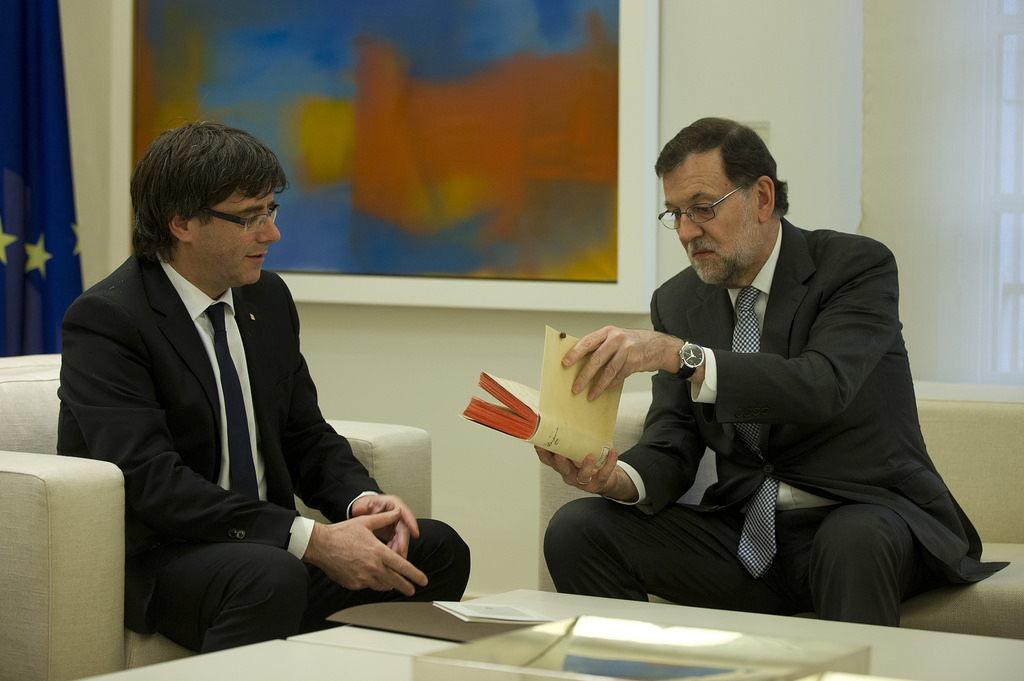Assuming that the Catalan elections on December 21 help to re-establish democratic coexistence in Catalonia within the bounds of Spanish law, the events of recent months and the course taken to here over, at least, the last decade, will not ensure that, when normal life resumes, things will be where they were before. But when? In 2004? 2006? 2010? Before then?
Concordia, convivencia y seny, democracia y diálogo en la ley #TodosSomosCataluña. Los catalanes hablarán con libertad y garantías 2112. MR pic.twitter.com/sVPqDgyqqI
— Mariano Rajoy Brey (@marianorajoy) October 29, 2017
Undoubtedly, we have seen consequential changes in attitudes, behavior, visions and ways of relating to one another for a large number of people, and in economic, social and political agents, all ensuring that very few things will go back to the way they were. In Catalonia, but also in Spain. It is even possible that what has occurred acts as a vaccine against Catalan independence movement as a false solution to the legitimate problems posed for many years by the so-called “Catalan question”, the solution to which must be found within the framework of political negotiation and reforms agreed by all parties.
This brief note is intended to point out three fundamental issues that, foreseeably, have been fundamentally changed. I do not claim that they are the only such issues. They are, however, the most important ones.
1. THE IDEA OF SPAIN
The declaration of Catalan “independence” on the part of its Parliament and the subsequent application of Article 155 of our Constitution to bring the situation back to constitutional legality show that, beyond other debates, not all Spaniards think the same about what Spain is. This issue of identity, which has impacted so seriously on our history over the last two hundred years, found its place in the 1978 Constitution based on the following three elements:
- Spain is a nation with single sovereign, which resides in the Spanish people.
- Spain is a nation comprised of, at least, three different realities, as are “nationalities and regions”, to which a new concept of “historic nationalities” is added.
- Spain is a single but composite nation, which is organized functionally on the basis of a multi-level state: the autonomous regions, which are part of the State.
A composite nation, single sovereignty, a shared State. This was the agreed solution provided by the Constitution of 78 to this key issue, between the rejection of the Basque Nationalist Party (PNV) on the one hand and of Alianza Popular on the other.
In recent years, however, and arising from the many vicissitudes of Spanish politics, which we won’t go into here, this constitutional definition has been openly questioned from the Basque Country (the Ibarretxe Plan) and from Catalonia (first the new Statute and, later, the independence movement), calling for both realities to be recognized as “nations” and not only “historic nationalities.”
In both cases such pretensions were not merely matters of syntax that would affect the concept of Spain as a composite nation, but it was argued that such recognition would involve a clear questioning of the “single sovereignty” established in the Constitution. Recognizing Catalonia and the Basque Country as “nations” rather than “historic nationalities” would constitute recognition of a certain “Basque” and “Catalan” sovereignty, that is to say, breaking the constitutional principle of “single sovereignty.”
This matter, to which different solutions were found in the case of the Basque Country (the defeat of the Ibarretxe Plan in the Spanish Parliament and acceptance of the result on the part of the Basque authorities) and of Catalonia (acknowledgement in the new Estatut, with no legal value, that the Catalan Parlament considered it to be a nation) has a major collateral effect on Spain as a whole, which goes far beyond the essentially syntactical and identity-based essentialism: the fear that recognition of some parts of the Spanish territory as “nations” rather than “nationalities,” historic or otherwise, would involve the concession privileges that are denied to other parts of the Spanish territory that are afforded no such recognition. With that, we would be altering another key constitutional principle: that stating that the right to difference between the peoples of Spain must not give rise to the recognition of privileges that question another essential principle; that of the equality of all Spaniards.
“Recognizing Catalonia and the Basque Country as ‘nations’ rather than ‘historic nationalities’ would constitute recognition of a certain ‘Basque’ and ‘Catalan’ sovereignty, that is to say, breaking the constitutional principle of ‘single sovereignty'”
We will be talking about all of this again if, after the application of Article 155 and the autonomous elections in Catalonia, the Commission for Constitutional Reform remains open in Congress and continues its work. Within the Commission, there are at least two public proposals on the matter:
- That of the Socialist Party (PSOE) proposing a change that, maintaining the recognition of Spain as a sovereign nation, would include recognition that it is a nation comprised of “nations, nationalities and regions” (plurinationality).
- That of other groups -and, according to surveys, over 80% of Catalans- which, by proposing the possibility of a legal, agreed referendum for Catalonia (and, we assume, other territories that fulfill the aspects indicated) to decide “its future” in the same way as Quebec and Scotland have done, are in fact, limiting the principle of “single sovereignty” by recognizing the existence of Catalan or Basque sovereignty.
It is difficult to think that today these issues will not be on the table if both the possibility of constitutional reform and the possibility of a Referendum Act are part of a solution to what has occurred in Catalonia that goes beyond merely combating the effects, but to resolve that causes that have led to this dramatic situation of discord and confrontation that we are faced with.

2. THE AUTONOMIC STATE
The Constitution of 78 established that Spain constitutes an “autonomic” State. But, as the detailed evolution of such recognition could not be predicted, it was limited to opening the door to possibilities, routes and procedures. Far from closing off on a model, it set the way for one, establishing a dominant role for the Constitutional Court in the case of conflicts between the different parts upon which the State was organized, and taking for granted the existence of “constitutional loyalty” that, very soon, was reflected in set of major agreements between the PP and PSOE to develop the autonomic Spain that we are familiar with today.
In 2004, after the last transfers of control of health and education to autonomous regions that still did not have such competencies and after many years of experience in terms of how the model functioned, the Spanish Government believed it had perfected our Autonomic State and, taking advantage of the fact the Catalonia has set in motion a Commission on Statute Reform in its Parlament, proposed, among other things, the following:
- Reform of the Constitution to close the autonomic model with explicit reference to existing communities and the perfection of the definition of the powers of the central Government.
- The creation of a Conference of Presidents as a “regular” body for high-level relations between the different constituent parts of the State.
- Reform of the Senate to comply with its mandate of being a “chamber of territorial representation”
- Improving the participation of the Autonomous Regions where decisions are taken on competencies exclusively theirs.
- Ordering the process, already underway, of reforming the statutes in those communities where they have been in place the longest and that have expressed the need to move towards what have been called “second generation” Statutes.
- Addressing the evident dysfunction of a competencies and financing model which sets forth that the autonomous regions have autonomy over 80% of Spanish public spending but where the central Government controls 80% of total income.
In accordance with that which had been traditional in our country at this time, a reformist initiative of this nature required consensus between the two largest national parties so that, from there, the other nationalist parties could be brought on board.
However, this never occurred and history shows how the reform of the Catalan Estatut become one of the principal areas of raging confrontation between the PP and PSOE, reaching the point that, once approved by the National Parliament, after the corresponding amendments with respect to the text sent by the Parlament of Catalonia and, even after being endorsed by the Catalans, the PP challenged it before the Constitutional Court and we all know what happened next.
All of this confrontation also paralyzed much of the necessary process of redefining, even constitutionally, the functioning of the Autonomic State. The need to do so, however, will become more acute than ever once we overcome the independence movement impasse. We have a multi-level state that does not function adequately in important matters such as financing. Now could be the time to go back to reviewing those adjustments necessary so that what exists functions better, whatever we decide to call it.
Specifically, we must make progress on three lines of reform:
- Clearer distinction of competencies of each administrative and political level, allowing the central Government to clearly exercise its constitutional functions, while at the same time creating common structure to manage what we have in common within the framework of a cooperative federalism. For example, a federal Tax Agency.
- Allow greater diversity in competencies between the autonomous regions in a bilateral framework that strengthens the high degree of bilateralism already enjoyed in the current system.
- Encourage greater horizontal cooperation between autonomous communities, without the need to go through central Government.
3. THE RESURGENCE OF WHAT UNITES US
The unity of action maintained without cracks between PP, PSOE and Ciudadanos in the management of the latest stage of the Catalan conflict has allowed us to recover the fact that, beyond the multiple differences between political parties on many issues, there are also things in common that unite them; issues on which acting jointly, finding a solution by consensus is a defining part of the democratic model of coexistence that must respect difference but also protect that which unites all of us, such as in this case, the defense of the territorial unity of Spain as set out in the Constitution.
Recent years have provided many examples of how the political parties have put their own electoral interests before the general interests of the country and which, consequently, have been blurred. The confrontation around the Catalan Estatut can be seen as a good example of this. Not even confronting the economic crisis suffered in Spain over the last decade has provided sufficient motivation for them to pool their efforts, in spite of both governments framing their actions within the framework defined and supervised by the European Union.
CONCLUSION
If, as a result of the events of recent weeks, stable arenas for collaboration and cooperation between parties on those matters where what’s important is not the position defended by each party, but the agreements that might be reached, a substantial change in the way of practicing politics and governing in Spain, with very positive results for citizens, could be achieved. This need for collaboration, reserving the arenas of confrontation for where they are necessary, is particularly evident in matters like the reform of the Constitution but, also, when it comes to agreeing measures for the fight against climate change, improving active employment and professional training policies and matters that are truly in the “national interest.”
If politics returns to being an instrument for doing things that improve the lives of citizens and that, in a globalized world, demands broad agreements on matters that go beyond a single government or legislature, the openings for populism will be limited and representative democracy will be strengthened. It’s not about there not being differences between some parties and others or all of them being the same, but about them being capable of confronting options and their alternatives and at the same time reaching agreement on those issues that are of a general interest. This is the strength that allowed us to complete the transition, enter Europe and develop our democracy. This is the strength that we must and can recover after the events of recent weeks.
AUTHOR:

Jordi Sevilla
Vice President of Economic Context Economic Context Area at LLORENTE & CUENCA
Mr Sevilla belongs to the Spanish Senior Corps of Commercial Technicians and State Economists, having held several positions in the Spanish Government including Chief of Staff to the Minister of Economy and Finance (1993-1996). Later on, he was appointed the Minister of Public Administration (2004-2007), where he passed the Electronic Administration Act and the Civil Service Basic Statute.
He has been a representative, spokesman for economic affairs in Congress, and President of the Climate Change Committee. In 2009, he worked as a senior counselor at PwC. In July 2015, he was appointed the head of the economic team of the Socialist Party’s presidential candidate—a position he held until September 2016.
He has been a professor at the EOI Business School and at the IE Business School. Jordi has published numerous books about economy and writes a weekly column for the Markets supplement of the daily newspaper El Mundo.





